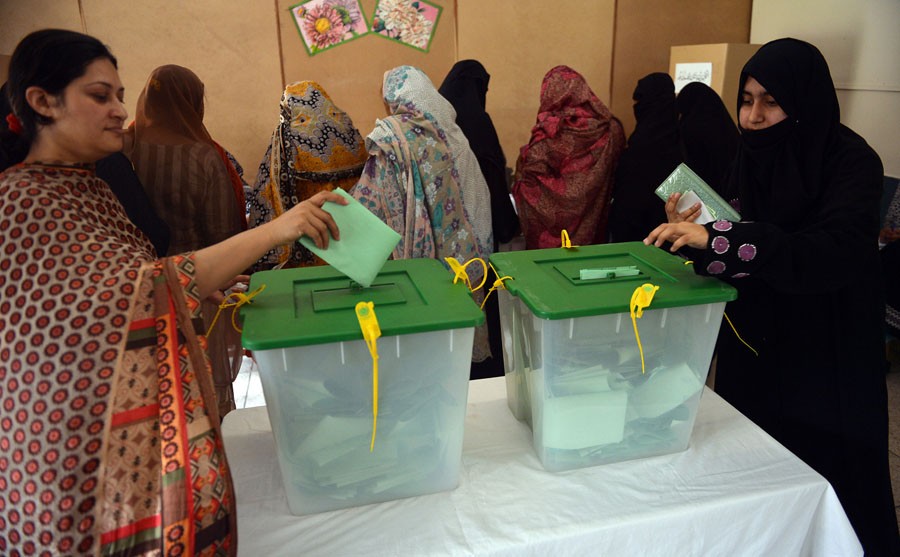
Women in KPK and tribal areas break many taboos by contesting the 2018 elections

The Elections Act, 2017 made it compulsory for all political parties to allot five per cent quota to women contesting for parliamentary seats. Moreover, according to the constitution, 60 out of 342 seats in the National Assembly and 137 seats in the provincial assemblies are reserved for women.
In 2018 general elections, as many as 171 women contestants (including 105 from party platforms and 66 as independent candidates) participated which is the highest number ever as there were 135 women candidates in 2013 elections and only 72 in 2008.
In 2018 general elections, Sunita Parmar was the first Hindu woman candidate who contested for Sindh Assembly constituency PS-56 and got only 352 votes where PPP candidate Faqir Shair Muhammad Balani won the seat.
Similarly, 48 women contested for National and Khyber Pakhtunkhwa assemblies’ constituencies but no one could win a general seat. Among them were the well-known politician Ayesha Gulalai contesting from four constituencies in KP, Punjab, Islamabad and Sindh and could secure 3538 votes only on all those seats.
Ex-MNA Asma Arbab Alamgir, wife of the former federal minister Arbab Alamgir Khan, contested on NA-27 and secured 24002 votes which is the highest number of votes secured by a female candidate throughout the province. However, she could not win the seat either.
PTI’s Hameeda Shahid was the first female candidate contesting election from Upper Dir for the provincial assembly seat PK-10 and got 10,904 votes. She was defeated by PPPP’s Malak Badshah Saleh.
Saima Khalid contested election on PTI ticket in Haripur on PK-42 and secured 10377 votes, though independent candidate Faisal Zaman got the highest votes there.
Iffat Kalsoom, Sameena Riaz, Nusrat Anjum, Irum Fatima, Shaista Naz, Tahira Bukhari, Sobia Shahid, Yasmeen, Syed Yasmeen Safdar, Sumera, Sidra Khalid, Maria Fatima, Zahida Sabeel, Robina Zahid, Rabia Gul, Qasima Shaheen, Shahnaz Bibi, Razia Jafri, Saira Saeed, Farzana Rehan, Khaista Begum, Imtiaz Bibi, Sumaira Khan, Farah Khan, Bibi Saeed, Nargis Saleem, Saima Shahzad, Surayya Shahab, Jamila Paracha, Mehar Sultana, Farzana Sheren, Zareen Riaz and Khurshed Bibi tried their luck and got a very low number of votes.
Another prominent candidate was former civil servant Ali Begum who contested election from the erstwhile Fata, which was merged with KP on May 31, 2018. She was a candidate for one of the two National Assembly seats from the Kurram tribal district. All other candidates were men, some belonging to politically influential families.
Ali Begum was very optimistic prior to the election and was of the opinion that not only female voters were in her favour but males were also supporting her as they were aware of her achievements and efforts for the development of the remote and underdeveloped area.
She was the second women contesting from tribal districts as Badam Zari from Bajaur Agency was the first female who contested in 2013 general election. Moreover, in 1979, she was the first tribal woman who qualified the All Pakistan Federal Civil Service examination.
Unlike other politicians and candidates, Ali Begum didn’t blame anyone during the election campaign. Instead, she focused on her ideas and plans for putting Kurram and the other tribal districts on the path of progress. She recalled having instructed her team members to respect rival candidates and their supporters as she felt those seeking public office should bring the people together instead of dividing them.
"A number of young people have joined my team and I have strong support of females," Ali Begum noted. "While coming to Pakistan, I was not expecting such tremendous support. In some cases, even the clerics have backed my candidature." Ali Begum was hoping the electorate in Kurram, particularly the women, would vote for her and give her a chance to serve them better than their past representatives.
Ali Begum wasn’t afraid of defeat as she stated a few days before the election, "Even if I don’t win, I will have created awareness among the people, especially women, about their rights. I also wanted to send a message to the world that the people of tribal districts are peaceful and tolerant". Unfortunately, she grabbed only 1365 votes and lost.
Predictably, all the female politicians mentioned above lost. Still they were brave enough to challenge their male rivals in the polls and motivate more women to follow in their footsteps.
However, 22 seats of KP Assembly and 9 seats of National Assembly are reserved for women politicians of KP and these women can play their role in women empowerment.